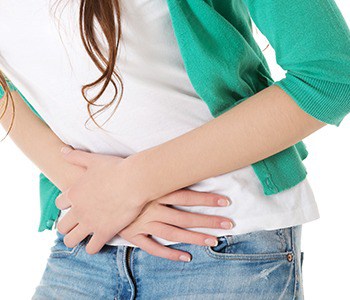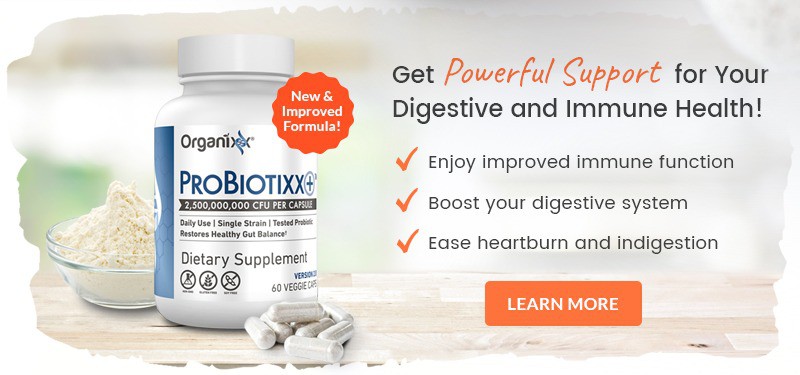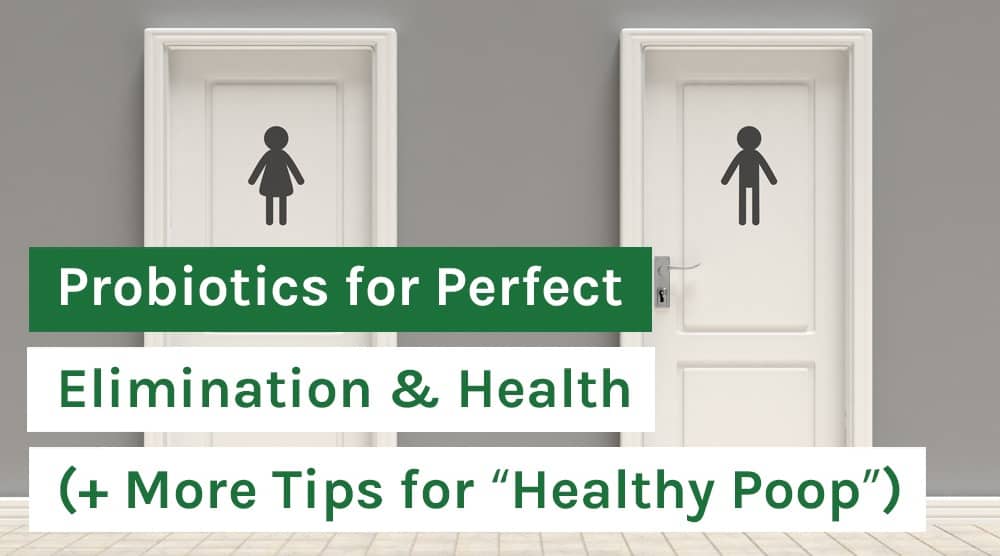Probiotics for Perfect Elimination & Health (+ More Tips for “Healthy Poop”)
In a hurry? Click here to read the Article Summary...
What is the perfect healthy poop? “An ideal stool looks like a torpedo – it should be large, soft, fluffy and easy to pass,” says Dr. Foxx-Orenstein, the president of the American College of Gastroenterology, on the site StoolAnalyzer (we’ll go more in-depth about what this site is and how it can help you a little later).
Let’s face it: bowel movements aren’t the most popular topic and chances are you aren’t chatting about your bathroom habits with friends and neighbors. And yet there are an increasing number of researchers who have chosen to study poop and it’s importance to overall health. Why?
Science is discovering that when it comes to not just your digestive system, but pretty much the whole shebang called your body, the characteristics of your stool and your daily elimination habits can be MAJOR INDICATORS for disease risk – both now and down the road.
Knowing what to look for in your bowel movements can put YOU in the “driver’s seat” about what you may need to change – including adding vital probiotics to your diet – to turn your pooped-out, stressed-out, and burnt-out body into one that is energized and “in the flow”… in more ways than one!
The Scary Statistics: Young People Feeling the Strain
 Here’s a reality: Americans aren’t healthy when it comes to their colons. How can we say this? Because of the sad new statistics concerning colorectal cancer amongst young people.
Here’s a reality: Americans aren’t healthy when it comes to their colons. How can we say this? Because of the sad new statistics concerning colorectal cancer amongst young people.
A 2017 study published in the Journal of the National Cancer Institute found that although rates for colon and rectal cancer have been dropping in recent years overall, this mostly reflects the situation for older people. When the study looked at adults ages 20 to 49, they found that those born in 1990 have double the colon cancer risk and quadruple the risk for rectal cancer compared with people born in or around 1950.
In 2017, an estimated 135,500 people will be diagnosed with colorectal cancer and about 50,200 individuals will die from the disease. The majority of these cancer deaths will be people under the age of 50.
“Trends in young people are a bellwether for the future disease burden,” says Rebecca Siegel, MPH, Strategic Director of Surveillance Information Services in the Intramural Research Department at the American Cancer Society. “Our finding that colorectal cancer risk for millennials has escalated back to the level of those born in the late 1800s is very sobering.”
When It Comes to Health, It Really IS a “Gut Feeling”
Of course, young people aren’t the only ones who have to worry about keeping channels of elimination clean and clear. We all do.
This is because gut health (including how healthy your stool is) is directly related to immune system health. As you may already know, the immune system is the first line of defense against pathogens and about 70% of the immune system is located in the gut area. Gut-Associated Lymphoid Tissue or GALT (part of another system called MALT, Mucosal-Associated Lympoid Tissue) is where most of your immune system cells come from.
According to a 2008 Italian investigation that focused on the connection between the gastrointestinal system and allergies, upwards of 80% of the plasma cells that wind up in your bloodstream and lymphatic pathways are produced in the GALT. Plasma cells are immune system cells whose main job is to hunt out antigens (i.e. foreign pathogenic substances) and destroy them.
Constipation: An American Epidemic
 So, how can you tell if your own elimination habits are working for you or against you? For an increasing number of individuals, trouble with poop comes when none comes at all. That is, in the very direct and often painful form of constipation.
So, how can you tell if your own elimination habits are working for you or against you? For an increasing number of individuals, trouble with poop comes when none comes at all. That is, in the very direct and often painful form of constipation.
A 2004 systematic review published in the American Journal of Gastroenterology found that about 63 million people in North America suffer from constipation. Over three million doctor visits occur each year by individuals whose main complaint is constipation, and many of these individuals (close to 89% according to the above review) have not received lasting relief over a year later.
Ideally, food should pass through the body in less than 24 hours. Today’s processed foods, including many restaurant foods, are lacking in probiotics, enzymes, and natural fibers, however. These are all substances which assist in allowing food to not only be assimilated nutritionally but also in allowing food to pass with ease.
What’s more, processed food is often high in sugars, simple carbs, and gluten. These factors combined with low water intake and a sedentary lifestyle means that it is not uncommon for the digestive system to take 70 hours or more for “transit” to occur.
And for some individuals, food does not pass at all. Many experts believe that a person leading a lifestyle such as the one described above may have up to 20 pounds of accumulated waste in their colon. Accumulated waste could mean fermentation in the gut, which can create gaseous substances that become toxic to the body and the brain.
Constipation can also lead to “leaky gut” (aka intestinal permeability) which has been connected to autoimmune disease, autism, and cancer. A quick search on the National Institute of Health database yields over a thousand studies that make the connect between imbalances in the colon and various forms of autoimmune disease, such as multiple sclerosis (MS).

Take the Test: StoolAnalyzer Can Help You Determine if You Have Healthy Poop
If you have constipation or other digestive discomfort, you can take expensive and sometimes invasive tests that can help you determine the state of your stool, and thus the state of your health. Professional testing is certainly recommended if you have severe symptoms such as constipation that lasts more than a week or blood in your stool. Also if you have been exposed to harmful pathogens like E. coli or Salmonella while traveling or by some other means.
If you have mild or occasional constipation or moderate digestive discomfort, however, there are other ways that are fast, easy, and even free!
In the age of the internet, StoolAnalyzer is one site that is filled with helpful information. It also uses a handy schematic called the Bristol Stool Chart that can help you visually identify what your poop looks like.
Yes, you will have to actually STUDY your poop before flushing it down the toilet, since StoolAnalyzer guides you through a series of very simple questions about the color, consistency, and regularity of your feces. Looking at your poop before you flush may seem strange at first, but isn’t getting to the root cause of your digestive and other health issues worth it? To take the StoolAnalyzer test, click HERE.
In the meantime, do you want to know what makes a healthy bowel movement in general? According to nutritionist Brenda Watson, author of eight books on the subject, a good, healthy poop can be determined by four factors:
- Noise
- Size
- Color
- Consistency
Healthy elimination is when your poop “barely makes a sound when it hits the water,” is long and easy to pass, is “fashionably golden brown,” is soft and slowly sinks to the bottom of the toilet. “If it sinks like a rock,” warns Watson, “it’s a sign that something is not quite right.”
The Power of Probiotics for Healthy Poop
 Constipation. Diarrhea. Bloating. Cramping. Gas. Acid Reflux. These annoying and sometimes downright painful conditions could be caused by a whole host of factors. But for most individuals, the underlying reasons for them all has to do with gut imbalance in one way or another. Actually, this is very good news, because it means that you can DO something about it!
Constipation. Diarrhea. Bloating. Cramping. Gas. Acid Reflux. These annoying and sometimes downright painful conditions could be caused by a whole host of factors. But for most individuals, the underlying reasons for them all has to do with gut imbalance in one way or another. Actually, this is very good news, because it means that you can DO something about it!
Gut imbalance is when a person has more bad bacteria (think Candida albicans or pathogenic forms of E. coli) than good bacteria (Lactobacillus and Bifidobacterium are two examples) in their gut overall.
Probiotic supplementation is probably the best thing you can do to help balance your “gut microbiome,” restore the correct balance of both bad and good bacteria in the digestive system, and help to ensure that all the mechanisms which depend on a healthy gut (including immune system function), are back on-line.
Researchers at King’s College in London conducted a meta-analysis of 14 other clinical studies and found that probiotic use increased the number of weekly bowel movements (i.e. helped with constipation) and slowing the “gut transit time” by roughly 12 hours (i.e. balanced out diarrhea). They also found that probiotic use helped to soften stools, making them easier to pass.
Many foods have probiotics as well as powerful enzymes and other substances in them that help the digestive system break down and assimilate nutrients. Fermented foods such as yogurt, kefir, fermented veggies, and raw pickles, as well as organic raw or lightly-steamed non-starchy vegetables are just a few examples.
For many individuals, however, simply consuming foods that contain probiotics is not enough. Many need extra help, and that is where a high-quality probiotic supplement can be essential.
5 Ways to Have Perfect, Healthy Poop!
Of course, the main thing you can do to improve how food moves out of you is to change what goes in. This includes dietary changes such as taking in more fiber, drinking more filtered water, cutting back on gluten and, most importantly, adding healthy, organic probiotic-rich foods or probiotic blends to your daily routine.
There are also other ways you can significantly improve your elimination pathways in addition to probiotics and diet. Here are 5 that can help:
#1. Squatting and/or using a bidet when you go.
The body is designed to eliminate waste while in a “squat” position. Sitting on a modern toilet unfortunately does not allow for complete elimination because it puts the body in a squished, unnatural position. Having a small stool under your feet while sitting on the toilet (we like the “Squatty Potty”) allows you to put yourself in a more natural position so that total elimination can occur. In addition, the “bidet” has been shown to be more hygienic and easier on the skin than using toilet paper. You can even install this fountain-like device directly on your existing toilet.
#2. Getting more exercise.
If inactivity encourages constipation, then getting yourself moving will encourage your bowels to move as well. Makes sense, right? According to a study published in the journal Gut, aerobic activity such as jogging can significantly help constipation, cutting “whole gut transit time” by a third to one-half.
#3. Staying away from laxatives and stool softeners.
According to Harvard Medical School, nearly half of the individuals who use these products are not satisfied with the results. This is either because they do not work or because of the short term or long-term side effects. In addition, some experts suggest that taking these products on a regular basis will cause the gut’s natural muscle movement to weaken over time.
#4. Taking probiotics with and after antibiotics.
If you have already added a high-quality source of probiotics to your daily routine, then gut imbalance may not be a problem if you ever need to take antibiotics. If you aren’t, then make sure you at least do so during your antibiotic treatment. A 2012 meta-analysis by the RAND corporation found that taking probiotics during a course of antibiotic treatment reduced the incidence of Antibiotic Associated Diarrhea (AAD) by 42%.
#5. Taking other pro-active measures.
Other actions such as colon-cleansing enemas, castor oil packs, and professionally-guided colonic treatments, as well as avoiding opioids, artificial sweeteners, and taking steps to lower stress are also great measures to ensure optimal digestive health.
So that’s the “scoop on healthy poop.” Not so bad after all, right? The important thing to remember is that the condition of your stool is an indication of the condition of your health in general – so take a minute the next time you go and check it out!
But seriously, keeping track of the condition of your bowel movements (or lack thereof) and making corresponding changes to your diet and lifestyle can help you and your processes of elimination stay in the “flow” and, more importantly, significantly decrease your risk for disease.
Organixx ProBiotixx+ formula contains a single, super-strain of Lactobacillus plantarum, designed to help alleviate constipation… eliminate gas and belly bloat… support your entire immune system… and give you total digestive protection.

 Sources:
Sources:
Article Summary
Science is discovering that the characteristics of your stool and your daily elimination habits can be MAJOR INDICATORS for disease risk.
Americans aren’t healthy when it comes to their colons. A recent study shows that those born in 1990 have double the colon cancer risk and quadruple the risk for rectal cancer compared with people born in or around 1950.
Gut health is directly related to immune system health; about 70% of the immune system is located in the gut area.
Today’s processed foods are lacking in probiotics, enzymes, and natural fibers, which assist in allowing food to pass with ease.
If you have mild or occasional constipation or moderate digestive discomfort, try taking the StoolAnalyzer test.
Probiotic supplementation is probably the best thing you can do to restore the correct balance of both bad and good bacteria in the digestive system.
5 ways to have perfect, healthy poop:
- Squatting and/or using a bidet when you go
- Getting more exercise
- Staying away from laxatives and stool softeners
- Taking probiotics with and after antibiotics
- Taking other pro-active measures





What is the best probiotic and prebiotic?
Hello Azi, thank you for your question. Due to individual differences, the best probiotic and prebiotic will depend on an individual's health needs and medical conditions. We highly recommend a consultation with your trusted medical specialist to help you determine this.
If you are looking for an oral probiotic antioxidant supplement, you might want to take a look at our very own Probiotixx. It is uses a unique probiotic blend that multiples quickly in your gut for maximum benefit. Check it out here: https://shop.organixx.com/collections/all-products/products/probiotixx.
hi, is it more effective to take probiotics before I go to bed instead of first thing in the morning?
I have diverticulitis , pass lots of gas but smelly. What the cause?
15 years ago I was diagnosed with Hemorrhoids. my Md said I would have them for the rest of my life. I observed the they were food dependent with in 3 weeks. so I started searching , probiotics were not that common 15 yr ago but eventually I happened on them, anything less than 1billion had no significant effect. eventually I got to 30Billion with every meal and Relief. some times I have to take 30 billion before food and at least 10 billion after food. Depending on how much sugar is in the food, therefore I do not eat out a lot .
On another topic I discovered eating liver or nuts (instead of iron pills) is a better way to restore your blood if your iron becomes to low.
This is an excellent article, but I'm surprised that you didn't mention fiber. IMO fiber is the most wasted commodity in the US. We remove the bran and germ from grains and feed them to the pigs, cows, and chickens. We peel the apples, pears and potatoes and throw the skins away. Many people even peel carrots. I hardly peel anything, except on the fruits and vegetables that are really thick. I learned from a friend that the white part of the orange rind is edible…although it does entail peeling the orange with a knife. Just last week I discovered that kiwis' skins are edible…just use a vegetable brush to scrub them and most of the fuzz comes off…and the rest, I assume, is fiber!